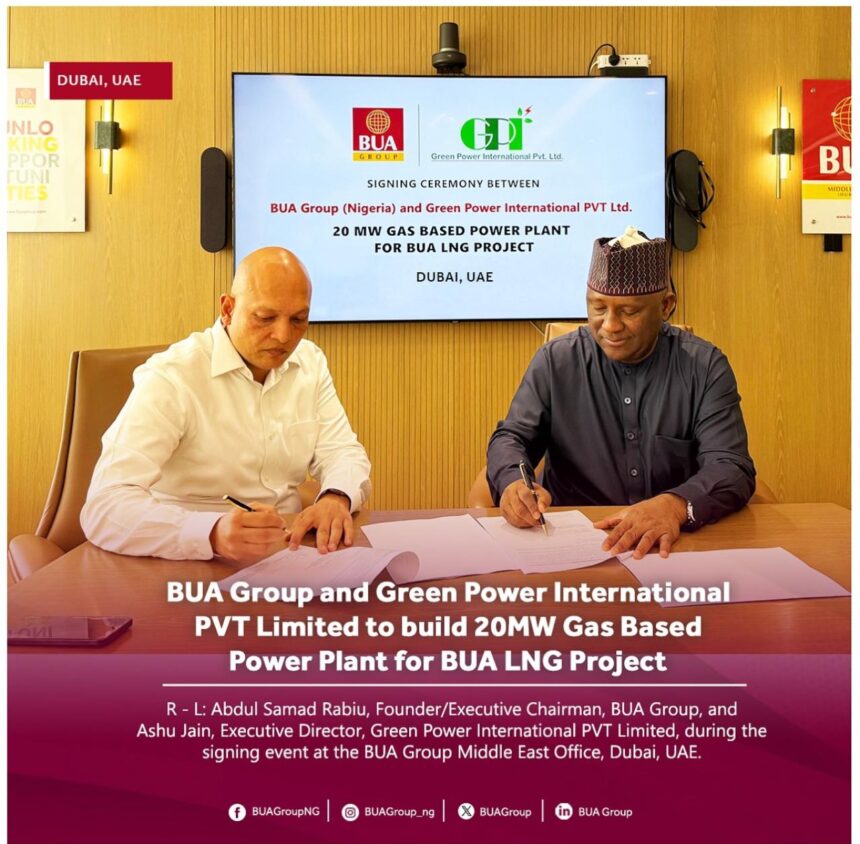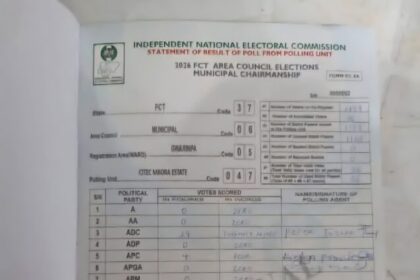– From gas turbines to golden harvests, Rabiu’s latest ventures blaze trails across Nigeria’s manufacturing, energy frontiers
Abdulsamad Rabiu beams like a sun-lit god. Whether in Africa or the Middle-East, his radiance pierces and illumines, the nooks and crannies of burgeoning economies. Some would liken him to a light-weaver, who stitches Nigerian light into the global fabric of entrepreneurship. This past week, Rabiu once again summoned the spirit of possibility, crafting mighty alliances that promise to lift Nigeria’s industrial spirit.
Amid the bustle of Dubai’s Middle East financial district, Rabiu forged visionary trade alliances. There, under the arc-lit gaze of the world, the Nigerian industrial colossus and founder of the BUA Group, inked a constellation of agreements. From an audacious 20MW gas power plant with Green Power International, to a sprawling 1,000 metric ton-per-day palm oil refinery with Alfa Laval, and a bold leap into food manufacturing with Qingdao ZhengYa Technology and Shanghai Poemy Machinery, Rabiu’s latest exploits resonate with promise and purpose.

A Season of Harvest in Dubai
It was not coincidence that Dubai, a city synonymous with ambition, was chosen as the theatre for this unfolding drama. Rabiu and his lieutenants orchestrated partnerships that read like battle plans for economic resurgence. The agreements shimmer with transformative potential: a 20MW gas-based power plant, ensuring energy sovereignty for BUA’s LNG operations—free from the erratic pulse of Nigeria’s national grid; 10 lines of fried instant noodles production, crafted through a pact with Qingdao ZhengYa Technology Company; automatic packaging lines for those noodles, secured via a deal with Shanghai Poemy Machinery Company and a 1,000MT/day palm oil refinery, realized through collaboration with Alfa Laval, poised to close Nigeria’s edible oil production gaps.
Each deal, a stone cast into the still waters of Nigerian industry, sending ripples of job creation, technological advancement, and economic diversification far beyond the point of impact.

Gas: The Breath of New Industry
At the heart of these achievements lies energy—the vital ether through which industry breathes. With the signing of the partnership with Green Power International, BUA Group redefines what it means to build with foresight.
The 20MW gas power plant is not merely an infrastructural addition; it is a defiance of Nigeria’s perennial power woes. While others curse the darkness of epileptic electricity, Rabiu strikes a match and builds a bonfire.
With Green Power’s expertise in low-emission, gas-based power generation, this project marries sustainability to necessity. It will furnish BUA’s LNG operations with reliable, clean energy, freeing it from the vagaries of a national grid long synonymous with failure. In doing so, Rabiu enshrines a new principle in Nigerian enterprise: energy sovereignty as a pillar of industrial independence.
More than that, it stands as a silent dare to Nigeria’s industrial class: “Power yourself—or perish.”
This model of embedded power generation is the invisible architecture of advanced economies—and now, thanks to BUA, Nigeria edges closer to that ideal.
Feeding the Nation, One Noodle at a Time
Rabiu’s vision does not end with gas turbines. He sees with panoramic clarity the urgent need to bolster Nigeria’s food processing capabilities—especially for a burgeoning youth population whose appetite and aspirations grow by the day.
Through his partnership with Qingdao ZhengYa Technology Company, Rabiu plants another flag of ambition: 10 production lines dedicated to fried instant noodles. Each line a testament to job creation, food security, and technological transfer.
But it is not enough to produce; excellence demands precision. Thus enters Shanghai Poemy Machinery Company, bringing cutting-edge automatic packing solutions to ensure that BUA’s noodles reach Nigerian homes, not just quickly, but impeccably.
This move into instant noodles is strategic. It taps into a fast-growing market sector and aligns with broader national imperatives of food self-sufficiency and value addition. It is not simply business; it is nationcraft.

The Palm Oil Renaissance
From the factories of fried noodles to the lush plantations of palm, Rabiu’s reach extends with almost prophetic precision.
Nigeria, once the world’s leading palm oil producer, now imports what it should abundantly supply. This historic irony is one Rabiu seeks to end.
In collaboration with Alfa Laval, BUA Group will erect a 1,000MT-per-day palm oil refinery and fractionation plant—a marvel of modern agro-processing that promises to resuscitate a dormant industry.
This refinery will do more than process oil; it will pump lifeblood into Nigeria’s agricultural value chains, stimulate rural economies, and reverse decades of dependence on imported edible oils.
Through the refinery, thousands of farmers will find markets, millions will find nourishment, and Nigeria will find, once again, its agricultural dignity.
And with Alfa Laval’s world-class technology, BUA ensures that the products refined will meet global standards—unlocking export opportunities and positioning Nigeria as a serious contender on the world stage of agro-industrial giants.
The Method Behind the Mastery
Rabiu’s magic lies not just in the deals he makes but in the method he applies—a method that sees partnerships not as transactions, but as transformations.
Every move he makes stitches a broader tapestry: local content development, job creation, food security, energy stability, and knowledge transfer. These are not buzzwords; they are the living threads of his industrial philosophy.
It is a strategy rooted in building ecosystems, not empires. And in so doing, Rabiu ensures that BUA Group’s success is tethered to Nigeria’s broader socioeconomic ascension.
He is not merely building businesses; he is engineering an entire industrial renaissance. Each new factory, each refinery, each gas turbine is a new hymn in a swelling chorus of national revival.
BUA’s Unbroken Legacy of Firsts
These new deals do not stand in isolation. They are the natural outgrowth of a legacy already studded with monumental achievements:
For instance, BUA’s cement plants in Edo and Sokoto have broken monopolies and democratized access to construction materials; BUA’s sugar refinery ventures have slashed Nigeria’s import dependency and emboldened the nation’s food sovereignty; the group’s fertiliser plants are fuelling the dreams of thousands of farmers, catalysing a quiet agricultural revolution; and its foray into steel production is laying the skeletal framework for future infrastructure across West Africa.
Now, with these latest Dubai accords, BUA tilts Nigeria’s industrial arc even further towards self-reliance and global competitiveness.
Rabiu’s strategy is clear: Diversify. Deepen. Dominate. And always—always—deliver.
Why Abdulsamad Rabiu Must Be Celebrated
Some names must be etched in marble in the catalogue of nation-builders, and Abdulsamad Rabiu’s surely belongs among them. He is a rare alchemist of vision and execution, a businessman who sees boardrooms not as battlefields for profit alone, but as crucibles for national transformation. He exemplifies the power of purposeful capitalism, the idea that private profit and public progress are not mutually exclusive, but mutually reinforcing.
In celebrating Rabiu, Nigeria celebrates the ethos of excellence. It celebrates the belief that solutions will not fall from foreign skies but will rise from local soil, watered by vision and nurtured by will. He is proof that Nigeria’s destiny need not be outsourced. It can, and must, be self-authored—line by line, deal by deal, turbine by turbine.
When the gas plant roars to life, when the first packets of BUA noodles roll off the assembly line, when the first drops of golden palm oil pour from Alfa Laval’s gleaming tanks, a new Nigeria will begin to emerge, not a nation waiting for aid, but one forging its fate with fire and faith.
In every spinning turbine blade, in every sizzling noodle fryer, in every drop of refined palm oil, Rabiu’s enduring message will resound: “Nigeria shall build and rise.”




